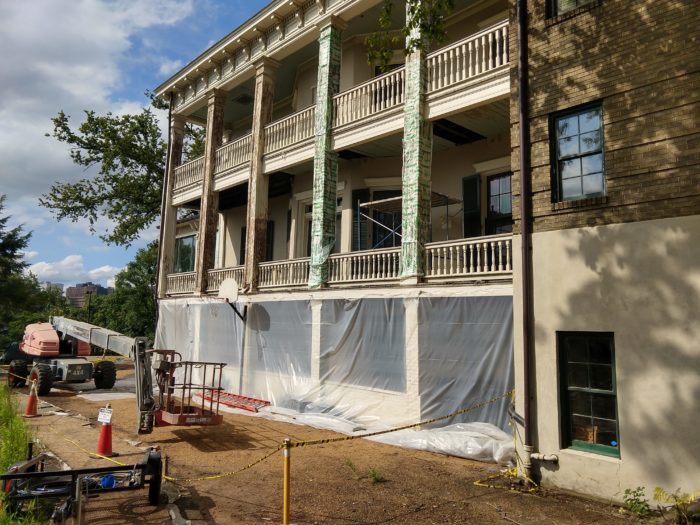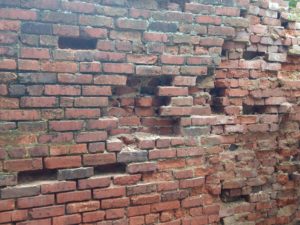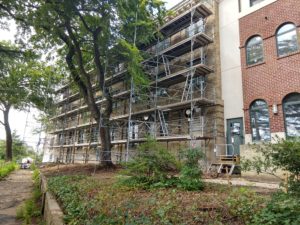
Richmond Hill, fueled by a $2 million capital campaign, has begun a restoration of the organization’s 42,000-square-foot building and its surrounding 2.1-acre campus. (Photos courtesy of Tim Holtz)
An interdenominational Christian retreat dating back more than 200 years in Church Hill is renovating its facility at 2209 E. Grace St. to prepare for the future.
Richmond Hill, fueled by a $2 million capital campaign, has begun a restoration of the organization’s 42,000-square-foot building and its surrounding 2.1-acre campus. All but $250,000 of the $2 million goal has been pledged, administrator Tim Holtz said.
“Fortunately, we had received an overwhelming majority of the funds of that $2 million before the coronavirus hit,” Holtz said. “So it’s allowing us to proceed with the project. And the money that we don’t yet have in hand has been pledged. We are in the process of identifying a financing source to develop a line of credit for us that would be paid for by these pledges.”
The makeover was prompted by a historic structures report in 2017 that identified needs for the property, including structural repairs on parts that date back to around 1820. The facility became a monastery just after the Civil War.
The project also will involve removing lead paint, scraping and reframing porches, restoring the brick wall running around the property, masonry repair and fixes to gardens, sidewalks and drains.
Glave & Holmes is the architect on the job, and Conquest Moncure & Dunn will handle construction.
“When the average person returns to our property once we’re done, they won’t necessarily immediately notice things that are different because the wall is still a wall and the porches are still porches,” Holtz said. “But at least now the wall’s not going to fall down.”
The project got underway in July and is expected to be done by February, though Richmond Hill is still in the process of securing some financing, Holtz said. The organization is handling some smaller projects on its own outside of Conquest Moncure & Dunn, including installations of LED lights and upgrades to heating and air conditioning controls.
The facility was previously renovated in an $8 million campaign in the early 2000s, though those upgrades couldn’t address all the retreat center’s needs, like the porches or lead paint. Hospitality is part of Richmond Hill’s core mission, so ensuring guests feel physically comfortable is a top priority.
Richmond Hill is planning a second phase to the project in 2021 that will focus on hospitality needs and aesthetic refurbishments to carpets, floors, walls and furniture.
Those moves had to be put off because of the pandemic, Holtz said, adding that the organization hopes it can begin the second wave of upgrades in late 2021 with fundraising in the first half of that year. Those upgrades will cost about $750,000.
The nonprofit, which has 15 employees, aims to serve the Richmond community through prayer, racial reconciliation, hospitality and spiritual development, Holtz said. Richmond Hill hosts thousands each year on day and overnight retreats from churches and other groups. Its revenue comes from those retreats, as well as charitable donations.
As for the racial reconciliation aspect of its mission, Holtz said one structure on Richmond Hill’s property is thought to be a former slave house. The organization hired archeologists to dig under the sidewalks and on the property during the renovations to better understand the property’s history.

Richmond Hill, fueled by a $2 million capital campaign, has begun a restoration of the organization’s 42,000-square-foot building and its surrounding 2.1-acre campus. (Photos courtesy of Tim Holtz)
An interdenominational Christian retreat dating back more than 200 years in Church Hill is renovating its facility at 2209 E. Grace St. to prepare for the future.
Richmond Hill, fueled by a $2 million capital campaign, has begun a restoration of the organization’s 42,000-square-foot building and its surrounding 2.1-acre campus. All but $250,000 of the $2 million goal has been pledged, administrator Tim Holtz said.
“Fortunately, we had received an overwhelming majority of the funds of that $2 million before the coronavirus hit,” Holtz said. “So it’s allowing us to proceed with the project. And the money that we don’t yet have in hand has been pledged. We are in the process of identifying a financing source to develop a line of credit for us that would be paid for by these pledges.”
The makeover was prompted by a historic structures report in 2017 that identified needs for the property, including structural repairs on parts that date back to around 1820. The facility became a monastery just after the Civil War.
The project also will involve removing lead paint, scraping and reframing porches, restoring the brick wall running around the property, masonry repair and fixes to gardens, sidewalks and drains.
Glave & Holmes is the architect on the job, and Conquest Moncure & Dunn will handle construction.
“When the average person returns to our property once we’re done, they won’t necessarily immediately notice things that are different because the wall is still a wall and the porches are still porches,” Holtz said. “But at least now the wall’s not going to fall down.”
The project got underway in July and is expected to be done by February, though Richmond Hill is still in the process of securing some financing, Holtz said. The organization is handling some smaller projects on its own outside of Conquest Moncure & Dunn, including installations of LED lights and upgrades to heating and air conditioning controls.
The facility was previously renovated in an $8 million campaign in the early 2000s, though those upgrades couldn’t address all the retreat center’s needs, like the porches or lead paint. Hospitality is part of Richmond Hill’s core mission, so ensuring guests feel physically comfortable is a top priority.
Richmond Hill is planning a second phase to the project in 2021 that will focus on hospitality needs and aesthetic refurbishments to carpets, floors, walls and furniture.
Those moves had to be put off because of the pandemic, Holtz said, adding that the organization hopes it can begin the second wave of upgrades in late 2021 with fundraising in the first half of that year. Those upgrades will cost about $750,000.
The nonprofit, which has 15 employees, aims to serve the Richmond community through prayer, racial reconciliation, hospitality and spiritual development, Holtz said. Richmond Hill hosts thousands each year on day and overnight retreats from churches and other groups. Its revenue comes from those retreats, as well as charitable donations.
As for the racial reconciliation aspect of its mission, Holtz said one structure on Richmond Hill’s property is thought to be a former slave house. The organization hired archeologists to dig under the sidewalks and on the property during the renovations to better understand the property’s history.





I confess I always wondered what that building was. It’s nice to see it being maintained